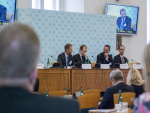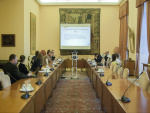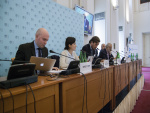7th International Symposium "Czech Foreign Policy"
The Institute of International Relations in Prague in cooperation with the Ministry of Foreign Affairs of the Czech Republic and the Heinrich-Böll-Stiftung Prague organized the 7th International Symposium "Czech Foreign Policy" - The Future of the Global Order: The Challenges for Small Democratic Countries. The event took place on 23-24 September 2015.
23. 9. 2015 (10:00)
The Great Hall, the Czernin Palace, MFA, Loretanske namesti 5
7th International Symposium "Czech Foreign Policy"
The Future of the Global Order: The Challenges for Small Democratic Countries
23 - 24 September 2015

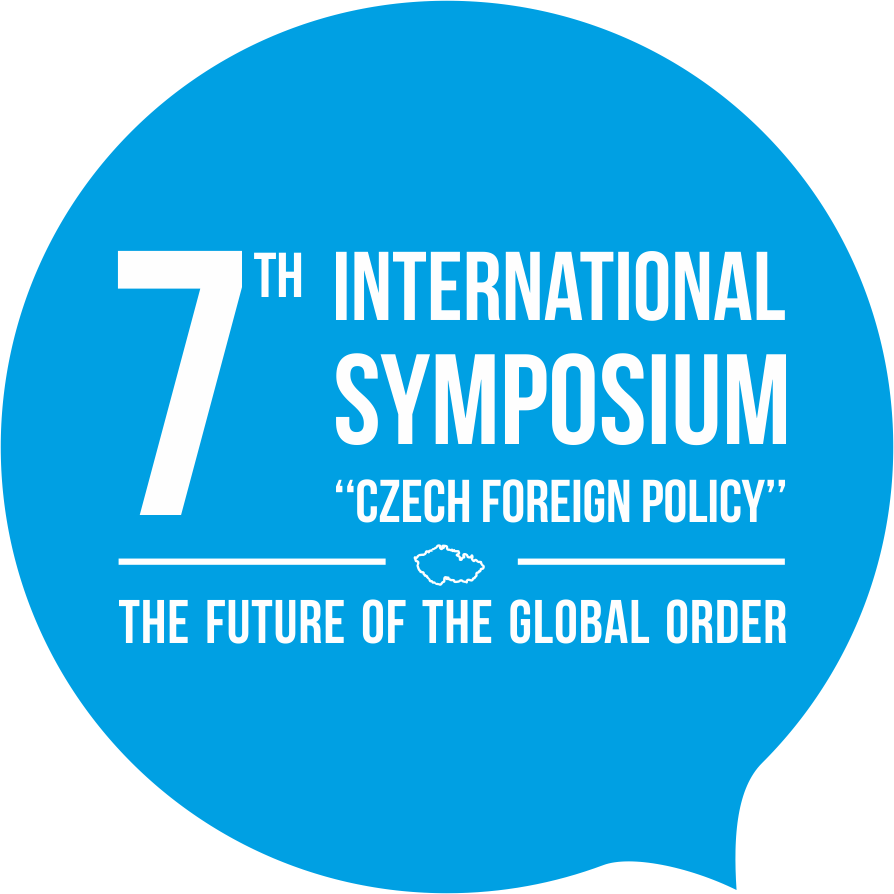 Ever since World War II, the way world affairs have been managed displayed a tendency towards a rule-based, multilateral "world order". Owing to this general tendency (and contributing to it themselves), small democratic countries in Europe and throughout the world have enjoyed an unprecedented level of stability, security, influence and perhaps even prestige. For decades, there has been a capacity of the world order to reform itself without shifting its fundamental principles. However, this adaptability also led to the increasing fragility of the order as a whole. As a result, there is a growing number of those who argue that the adequacy and legitimacy of the present arrangements and institutions of the international order are rapidly weakening. The tendency towards multilateralism and rule-based order slowed down significantly during the past decade or so, and it even seems to have come to a complete halt – if not to a reversal of its former course – quite recently. The small democratic countries are those which have most to lose if the international society turns its back on the norms and rules that have co-defined world affairs for the past 70 years.
Ever since World War II, the way world affairs have been managed displayed a tendency towards a rule-based, multilateral "world order". Owing to this general tendency (and contributing to it themselves), small democratic countries in Europe and throughout the world have enjoyed an unprecedented level of stability, security, influence and perhaps even prestige. For decades, there has been a capacity of the world order to reform itself without shifting its fundamental principles. However, this adaptability also led to the increasing fragility of the order as a whole. As a result, there is a growing number of those who argue that the adequacy and legitimacy of the present arrangements and institutions of the international order are rapidly weakening. The tendency towards multilateralism and rule-based order slowed down significantly during the past decade or so, and it even seems to have come to a complete halt – if not to a reversal of its former course – quite recently. The small democratic countries are those which have most to lose if the international society turns its back on the norms and rules that have co-defined world affairs for the past 70 years.
The 7th symposium thus aimed to tackle some of the most pressing questions of today:
- Will the new rising power become a part of a solution of the problem of the present liberal order or a part of the dissolution thereof?
- What can the small democratic countries do to tackle this challenge and infuse more credibility into the multilateral global order?
- How should they live, communicate and even cooperate with countries that have the status of major international or regional players but refuse to adhere to the norms and even the values cherished by democratic countries?
Programme
You can download the programme of the symposium here.
You can download the report from the event here.
You can download the speech of minister Lubomír Zaorálek here (in Czech).
Click on the name of the panel to see a video from it.
WEDNESDAY 23
- Opening Address by Steven Kashkett
- Round Table: Think Tanks, Universities and Research Institutes as Partners in Government’s Diplomacy
- Keynote Address by Karel Kovanda
- The Future of (Liberal) Global Order: Central European Perspectives
- The European Union and the Multilateral Order: the Eastern Partnership between Instrument and Policy
THURSDAY 24
- Opening Address by Minister Lubomír Zaorálek
- The Future of Global Order and Challenges for Democratic Countries
- Keynote Address by Walter Russel Mead and discussion with Jiri Ruzicka
- The Czech Foreign Policy and the Future of Global Order: Between Activism and Free Riding
- Between Ignorance, Prejudice and Partnership: Politicians, Journalists, Diplomats and Experts and the Prospects of the Czech Foreign Policy
WEDNESDAY 23
Symposium Opening: Michal Kořan, Deputy Director, Institute of International Relations Prague
Opening Address by Steven Kashkett, Deputy Chief of Mission of the Embassy of the United States of America in Prague
[youtube]http://www.youtube.com/watch?v=ArZi_jagwC8[/youtube]
Round Table: Think Tanks, Universities and Research Institutes as Partners in Government’s Diplomacy
[youtube]http://www.youtube.com/watch?v=kXzsaHpdmVA[/youtube]
Keynote Address and Discussion
[youtube]http://www.youtube.com/watch?v=jHceo2z0thg[/youtube]
The Future of (Liberal) Global Order: Central European Perspectives
[youtube]http://www.youtube.com/watch?v=I00WZILiVl8[/youtube]
The European Union and the Multilateral Order: the Eastern Partnership between Instrument and Policy
(an international roundtable organized by the Association for International Affairs (AMO) and supported by the International Visegrad Fund)
[youtube]http://www.youtube.com/watch?v=C-HrkYhylW4[/youtube]
- Opening speech: Štefan Füle, Former European Commissioner for Enlargement and European Neighbourhood Policy, Ministry of Foreign Affairs of the Czech Republic
THURSDAY 24
Opening Address by Minister Lubomír Zaorálek
[youtube]http://www.youtube.com/watch?v=vLHd7JY2I0U[/youtube]
The Future of Global Order and Challenges for Democratic Countries
[youtube]http://www.youtube.com/watch?v=w5yb_nYzc58[/youtube]
Keynote Address by Walter Russel Mead (Videoconference) and Discussion with Jiří Růžička
[youtube]http://www.youtube.com/watch?v=qqif1TN4fz4[/youtube]
The Czech Foreign Policy and the Future of Global Order: Between Activism and Free Riding
[youtube]http://www.youtube.com/watch?v=pTDyJhlWUbo[/youtube]
Between Ignorance, Prejudice and Partnership: Politicians, Journalists, Diplomats and Experts and the Prospects of the Czech Foreign Policy
[youtube]http://www.youtube.com/watch?v=jpzxNlc4zSA[/youtube]
Closing Remarks
- Michal Kořan, Deputy Director, Institute of International Relations Prague
Sympozium in Media - Sympozium v médiích
- Český rozhlas Plus - Den podle Barbory Tachecí, (cca 12:00min), 23. 9. 2015
- Jen zavřít okna a dveře do Evropy nestačí, Soli Özel a jeho vystoupení citovány v článku serveru iHNED.cz, 24.9.2015
- Tureckou bránu pro uprchlíky chce Evropská unie zalepit miliardou eur, Soli Özel a jeho vystoupení citovány v článku serveru iHNED.cz, 25.9.2015
Bios of selected foreign speakers
Arzu Geybullayeva is political analyst for the Caucasus region and a specialist in human rights and press freedom in Azerbaijan. Arzu graduated at Ankara´s Bilkent University and the London School of Economics and political science. She holds a Bachelor´s degree in International Relations from Bilkent University and a Master´s of Science degree in Global Politics from the London School. Her areas of interest include regional politics, conflict resolution, and new social media. Mrs. Geybullayeva has worked extensively on the Caucasus for a number of think tanks, research institutes, non – profit organizations, and news outlets as a writer, journalist, and regional analyst since 2009. Since 2010 she has worked as a co-director at the Imagine Center for Conflict Transformation, a non-profit organization that promotes dialogue, cooperation, and peace-building processes in conflict-torn societies including Armenia and Azerbaijan, and is the managing editor of the Neutral Zone, a platform for alternative voices from Armenia and Azerbaijan. Since 2013, Mrs. Geybullayeva worked as writer and correspondent in AGOS newspaper and associate scholar in the Foreign Policy Research Institute. She writes for Al Jazeera, Global Voice, Agos, and her English language blog - Flying Carpets and Broken Pipelines.
Johannes Gerschewski is a research fellow at the department of “Democracy and Democratization” at the WZB Social Science Center Berlin. He co-heads with Wolfgang Merkel a DFG-funded project on “Critical Junctures and the Survival of Dictatorships”. His research interest lies in comparative autocracy research, analysis of democratization processes as well as methodological questions. In his dissertation that he handed in 2014 at Humboldt University Berlin he compares historically the stabilizing conditions of East Asia’s autocratic regimes since 1945. He has founded with colleagues the methodologically oriented “Berlin Summer School in Social Sciences”. Between 2001 and 2008 Johannes studied political science, philosophy, and economics as well as International Business and Cultural Studies in Passau, Berlin, and Seoul, before he worked for a year at the GIGA Institute for Asian Studies in Hamburg. From August to December 2014 he was a guest at the Weatherhead Center for International Affairs at Harvard University. Mr. Gerschewski is the author of several books, including the The Three Pillars of Stability: Legitimation, Repression, and Cooptation in Autocratic Regimes, Ideokratien als autokratischer Subtypus?, and other.
Walter Russell Mead is James Chace Professor of International Affairs and Humanities at Bard College, the Editor-at-Large of The American Interest, and Distinguished Scholar in American Strategy and Statesmanship at the Hudson Institute. From 1997 to 2010, he was a fellow at the Council on Foreign Relations, serving as the Henry A. Kissinger Senior Fellow for U.S. Foreign Policy from 2003 until his departure. Mr. Mead’s chief intellectual interests involve the rise and development of a liberal, capitalist world order based on the economic, social, and military power of the United States and its closest allies. He is interested in the implications of this evolving world order for American foreign policy and for American and international society. He is a founding board member of the New America Foundation, and also serves on the board of Freedom House. Mr. Mead is the author of several books, including the Gelber Prize-winning Special Providence: American Foreign Policy and How it Changed the World. Most recently, he wrote God and Gold: Britain, America, and the Making of the Modern World. He also writes regularly on international affairs for the Los Angeles Times, New York Times, Wall Street Journal, International Herald Tribune, Washington Post, etc. and serves as a regular reviewer of books for Foreign Affairs.
Soli Özel is a Richard von Weizsäcker Fellow at the Robert Bosch Academy in 2015. He is a professor of International Relations at Kadir Has University in Istanbul and a columnist at Habertürk daily newspaper. He also advises the Turkish Industrialists' and Businessmen's Association (TÜSIAD) on foreign policy issues. He has guest lectured at Georgetown, Harvard, Tufts and other US universities and has taught at UC Santa Cruz, SAIS, the University of Washington and the Hebrew University. He has spent time as a fellow of St. Anthony’s College, Oxford and was a visiting senior scholar at the EU Institute for Security Studies in Paris. He has been a Fisher Family Fellow of the “Future of Diplomacy Program” at the Belfer Center of the Kennedy School of Government at Harvard University. In 2013, he was a Keyman fellow and a visiting lecturer at Northwestern University. He is on the board of directors of International Alert and a member of the European Council on Foreign Relations. Soli Özel regularly contributes to the German Marshall Fund’s web site’s “ON Turkey” series. His work has been printed in different publications in Turkey and abroad, including The International Spectator, Internationale Politik, Foreign Policy and the Journal of Democracy. His two latest published works are “A Moment of Elation: The Gezi Protests/Resistance and the Fading of the AKP Project” in "The Making of a Protest Movement in Turkey: #Occupygezi", and an article co-authored with Serhat Guvenc, entitled “NATO and Turkey in the Post-Cold War World: Between Abandonment and Entrapment”.
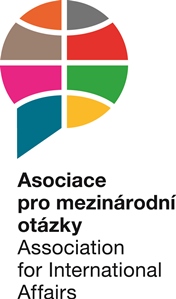 |
7th International Symposium documents
Foreign Minister`s Speech, Programme and Report
Video 1
Video 2
Video 3
Video 4
Video 5
Video 6
Video 7
Video 8
Video 9
Video 10
Auspice
Ministry of Foreign Affairs of the Czech Republic, Heinrich-Böll-Stiftung Prague, Association for International Affairs, International Visegrad Fund

